
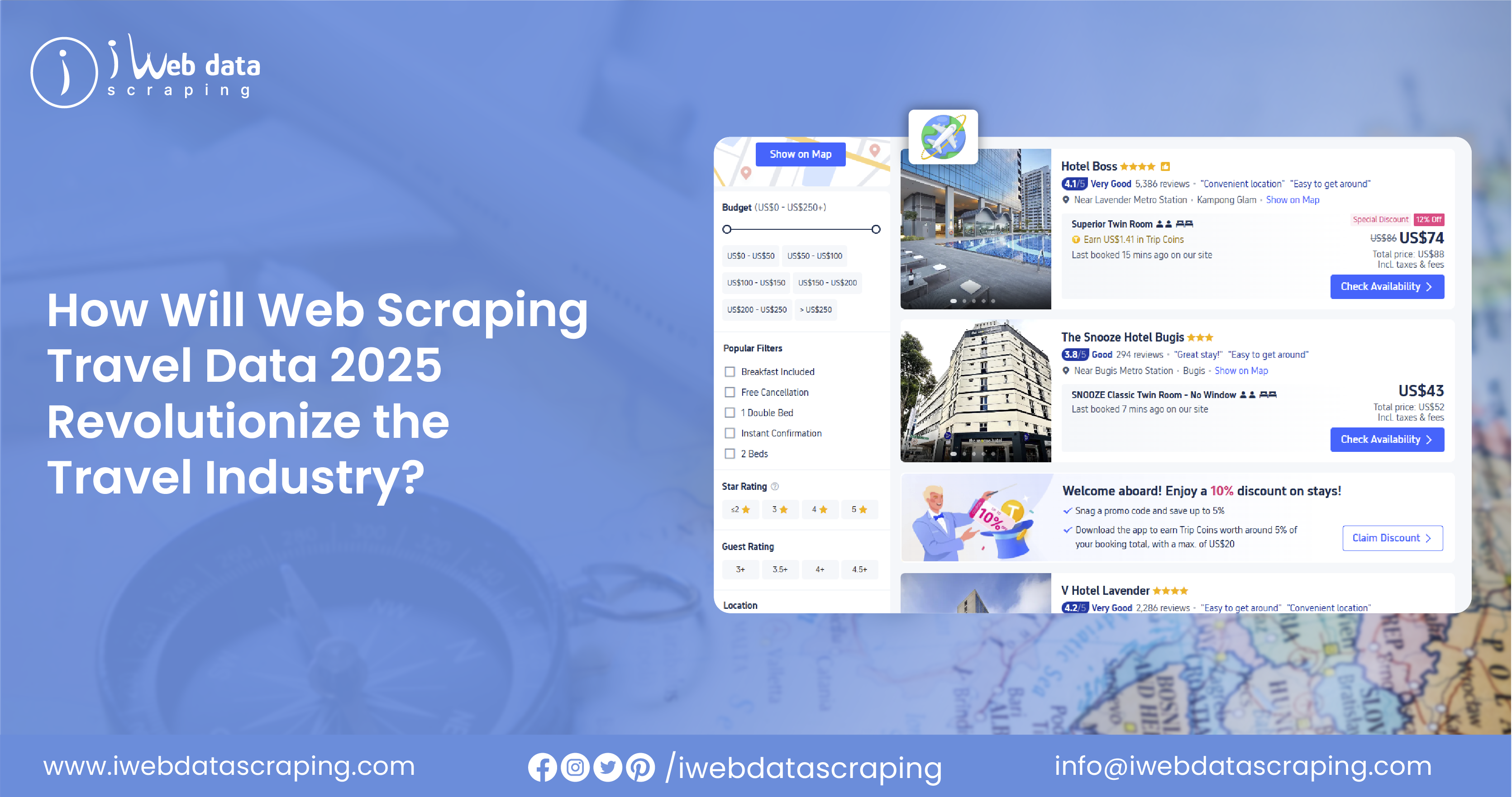
The travel industry has seen a massive shift over the past decade, primarily driven by technology that has changed how consumers plan, book, and experience travel. Web Scraping Travel Data 2025 has become a cornerstone of the industry's evolution, enabling businesses to harness data for better decision-making. With travel data extraction, companies can gain critical insights into market trends, optimize pricing strategies, and improve customer experiences. Revolutionizing Travel with Data Extraction, this technique allows for the automated collection of information from a wide range of online platforms, including airlines, hotels, travel agencies, and review sites. These insights give businesses the competitive edge they need in a rapidly changing market, helping them adapt and respond to consumer preferences and industry shifts. Data scraping is now vital for businesses looking to thrive in the dynamic travel landscape of 2025.
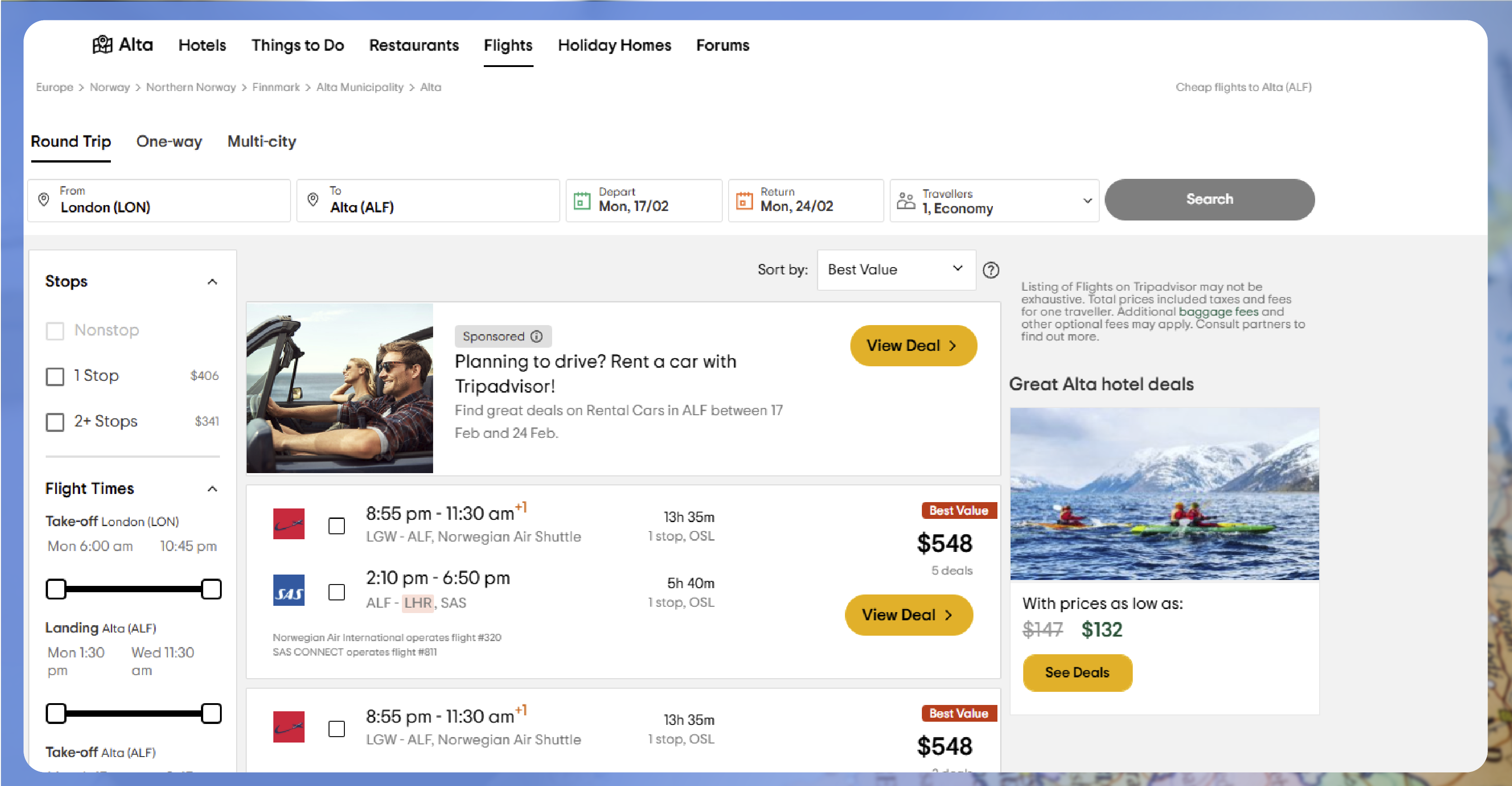
As digital platforms become the primary resource for travel planning, the available data has surged. Consumers now rely on online travel agencies (OTAs), airline and hotel websites, review platforms, social media, and blogs to research destinations and make bookings. Scrape Travel trends, Prices, and Insights to collect and analyze this growing wealth of information. Real- Time Travel Insights with Data Scraping enables companies to predict consumer behavior, identify emerging market trends, and develop personalized offerings tailored to individual preferences. With travel data scraping, businesses gain a deeper understanding of customer needs and the evolving dynamics of the travel industry. This valuable data empowers companies to stay ahead of competitors, adjust pricing strategies, and deliver targeted services, ensuring they remain agile and relevant in an increasingly digital and data-driven market.
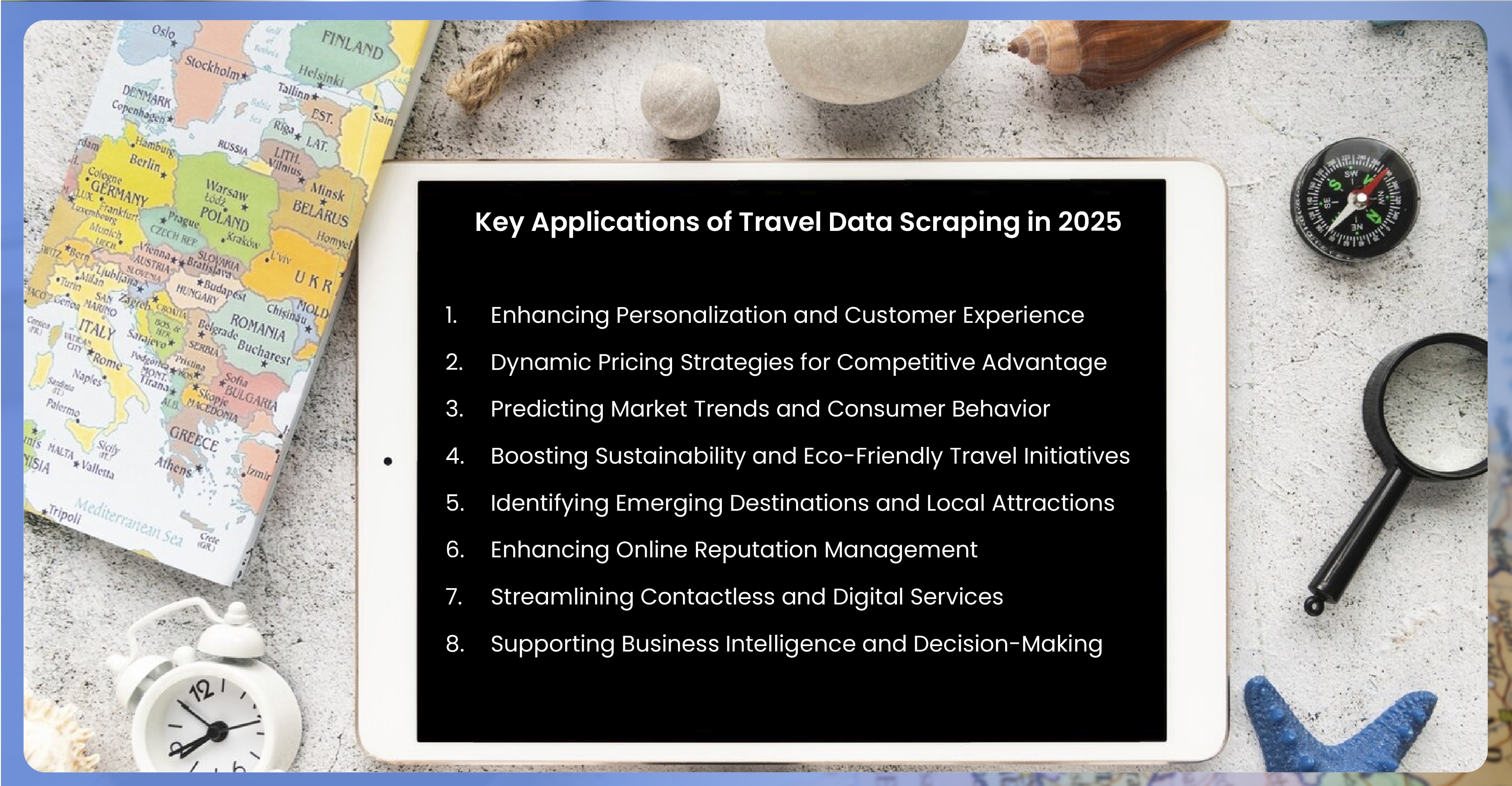
In 2025, travel data scraping will play a pivotal role in enhancing customer experiences and optimizing operations. By extracting real-time insights from various sources, businesses can improve pricing strategies, demand forecasting, personalized offerings, and competitive analysis across the travel industry.
1. Enhancing Personalization and Customer Experience
Modern travelers expect hyper-personalized experiences tailored to their preferences. Businesses can offer customized recommendations on destinations, accommodations, and activities by analyzing search histories, booking patterns, and social media interactions. AI-driven travel recommendation engines powered by Travel Data Scraping Services deliver real-time suggestions, making travel planning seamless and highly personalized. This allows companies to build stronger customer relationships, increasing engagement and loyalty.
2. Dynamic Pricing Strategies for Competitive Advantage
Pricing in the travel industry fluctuates based on demand, seasonality, and external factors such as economic conditions and geopolitical events. Travel data scraping enables companies to monitor competitor pricing in real-time, adjust their rates accordingly, and optimize revenue. Airlines, hotels, and OTAs use sophisticated algorithms integrating Travel Data Scraper to implement dynamic pricing models. This ensures they remain competitive while maximizing profitability.
3. Predicting Market Trends and Consumer Behavior
Travel data scraping helps businesses track market trends and forecast demand patterns. By analyzing data from multiple sources, including booking websites, customer reviews, and social media, companies can identify shifts in traveler preferences. For example, insights into rising interest in adventure tourism, eco-friendly travel, or luxury experiences allow businesses to proactively adapt their marketing and service strategies. With Travel Data Intelligence, businesses gain valuable insights that drive more intelligent decisions.
4. Boosting Sustainability and Eco-Friendly Travel Initiatives
Sustainability is a primary concern for modern travelers. Consumers increasingly prioritize eco-friendly travel options such as green hotels, carbon-neutral flights, and sustainable tourism activities. Travel companies use data scraping to extract valuable insights from sustainability ratings, eco-travel blogs, and customer reviews to tailor their offerings and marketing efforts toward environmentally conscious travelers. This helps businesses align with consumer expectations while promoting responsible tourism using Travel and Tours Datasets.
5. Identifying Emerging Destinations and Local Attractions
Today's travelers seek unique and immersive experiences beyond traditional tourist hotspots. Businesses can identify emerging destinations and highlight hidden gems by scraping data from travel blogs, forums, and social media discussions. This allows travel agencies and platforms to promote lesser-known locations, creating new opportunities for tourism and boosting local economies.
6. Enhancing Online Reputation Management
Customer reviews and online ratings significantly influence travel decisions. Businesses can monitor feedback across multiple review platforms such as TripAdvisor, Google Reviews, and Trustpilot by leveraging travel data scraping. Analyzing sentiment trends helps companies address customer concerns, improve service quality, and build a strong brand reputation. Real-time insights allow businesses to respond to negative reviews promptly and enhance customer satisfaction.
7. Streamlining Contactless and Digital Services
The demand for digital convenience and contactless travel solutions has increased post- pandemic. Scraped travel data provides insights into consumer preferences for digital check-ins, AI-powered travel assistants, biometric authentication, and other contactless services. This allows travel companies to enhance their technological offerings, ensuring smoother, more convenient, and safer travel experiences.
8. Supporting Business Intelligence and Decision-Making
Travel data scraping is crucial in business intelligence by offering real-time insights into industry performance, customer behavior, and competitive strategies. Travel companies, airlines, and hotel chains use this data to make informed business decisions, optimize resource allocation, and create targeted marketing campaigns. Data-driven insights also help businesses enhance operational efficiency and identify new revenue streams.
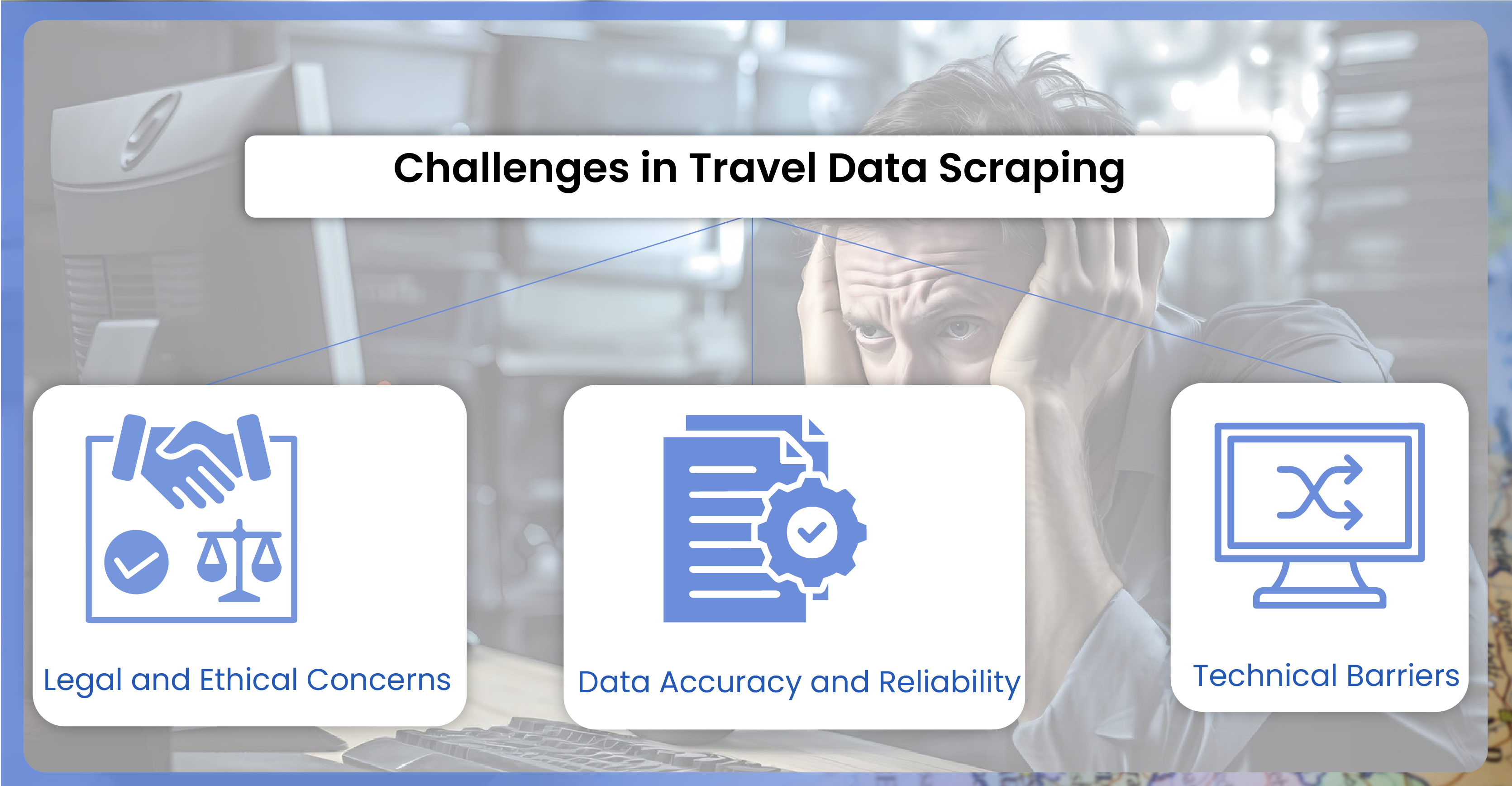
While travel data scraping offers immense benefits, it also presents particular challenges. Some of the key issues include:
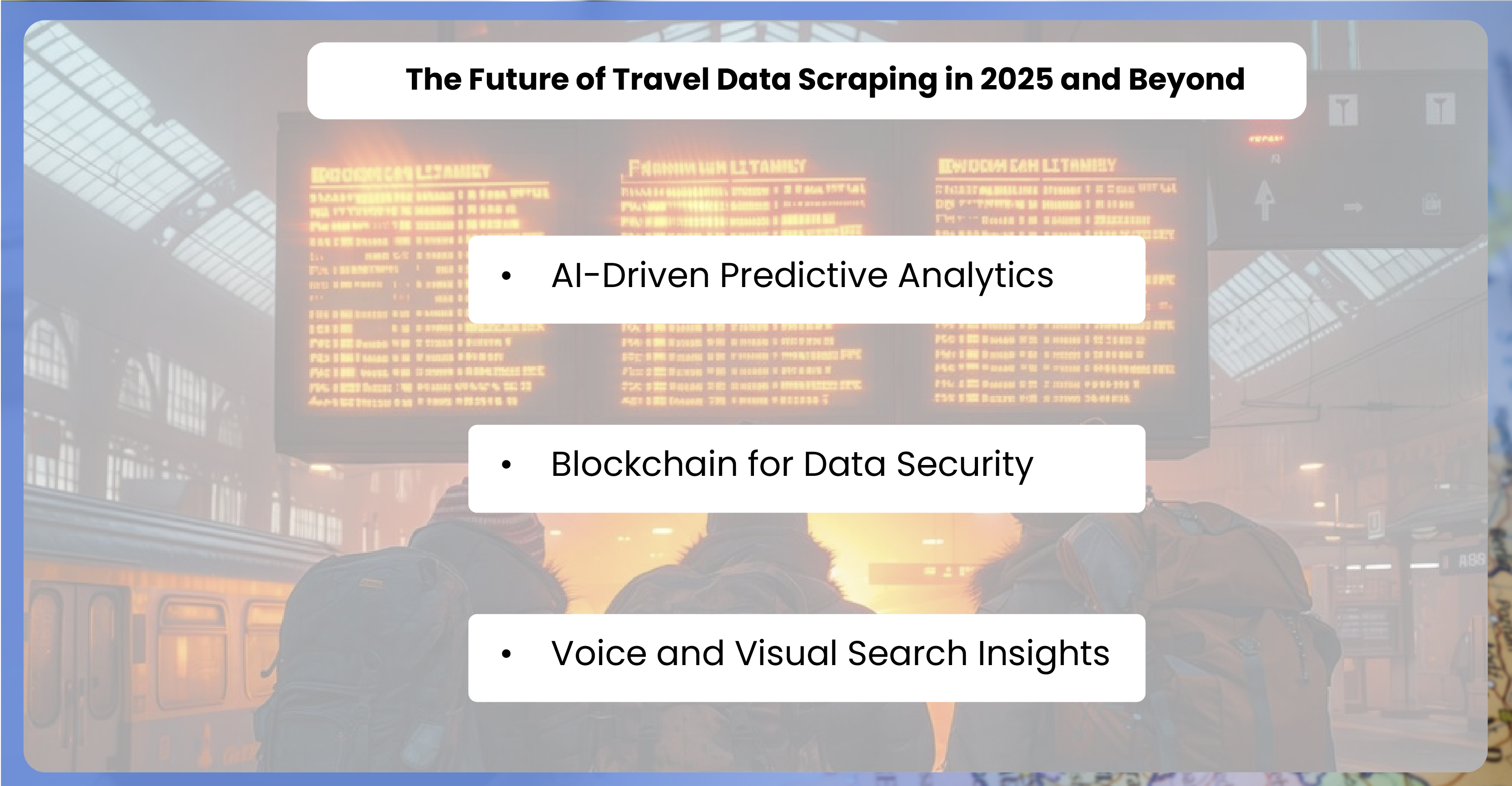
Travel data scraping will evolve as technology advances, offering even more sophisticated analytics and insights. Integrating AI, machine learning, and big data analytics will enhance scraped data's accuracy and predictive capabilities. Future trends may include:
In 2025, travel data scraping is revolutionizing the travel industry by giving businesses the insights they need to stay competitive, personalize customer experiences, optimize pricing strategies, and predict future trends. As data-driven decision-making becomes the industry standard, companies that leverage travel data scraping effectively will gain a significant edge in understanding and meeting consumer demands. Despite challenges, continuous advancements in AI, big data, and automation will further enhance the impact of travel data scraping, shaping the future of the travel industry for years to come.
Experience top-notch web scraping service and mobile app scraping solutions with iWeb Data Scraping. Our skilled team excels in extracting various data sets, including retail store locations and beyond. Connect with us today to learn how our customized services can address your unique project needs, delivering the highest efficiency and dependability for all your data requirements.